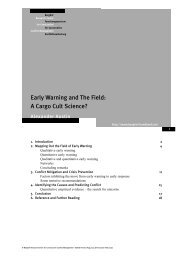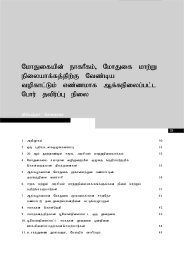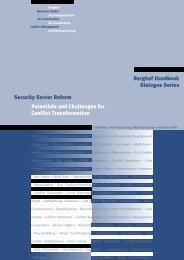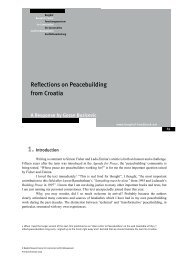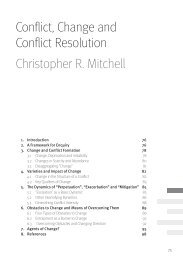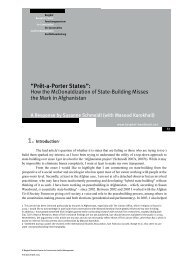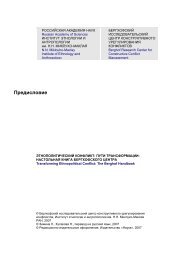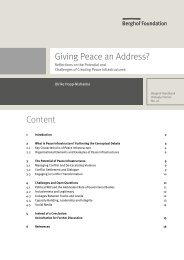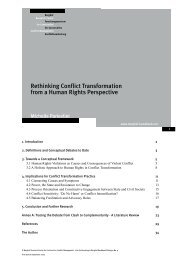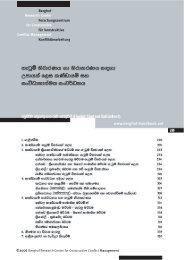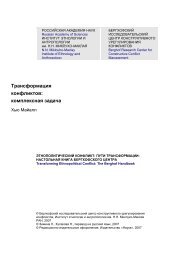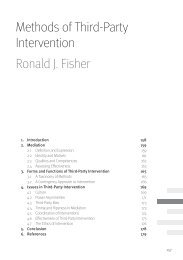Human rights and conflict transformation: The challenges of just peace
Human rights and conflict transformation: The challenges of just peace
Human rights and conflict transformation: The challenges of just peace
Create successful ePaper yourself
Turn your PDF publications into a flip-book with our unique Google optimized e-Paper software.
112<br />
Bergh<strong>of</strong> H<strong>and</strong>book Dialogue No. 9<br />
<strong>conflict</strong> situations can be excruciatingly difficult <strong>and</strong> that imperfection may be embedded in any<br />
modus decided upon. It is probably inherent to the issue at h<strong>and</strong> <strong>and</strong> the complex context in which it<br />
arises. Of course, acknowledging this does not resolve the issue. Questions arise immediately when<br />
entertaining the notion <strong>of</strong> sufficient <strong>just</strong>ice – for example, what is sufficient? Who is to decide? On<br />
what basis? And sufficient for whom?<br />
Following publication <strong>of</strong> the initial article, several persons (not contributing to this<br />
Dialogue) informed me that they were much relieved at my observation that the debate has shifted<br />
from an emphasis on <strong>peace</strong> versus <strong>just</strong>ice to <strong>peace</strong> <strong>and</strong> <strong>just</strong>ice. Yet I soon became aware that<br />
another commentator had <strong>just</strong> come to the reverse conclusion: in her view, the debate on <strong>peace</strong> <strong>and</strong><br />
<strong>just</strong>ice has only intensified in recent years (Hayner 2009b). This raised the question <strong>of</strong> how this<br />
was possible. Which observation was correct? I came to realize that both assessments are valid,<br />
in that they reflect realities that exist concurrently. <strong>The</strong> former relates to <strong>peace</strong> <strong>and</strong> <strong>just</strong>ice in a<br />
broader sense, as referring to the intersection <strong>of</strong> human <strong>rights</strong> <strong>and</strong> <strong>conflict</strong> <strong>transformation</strong>. <strong>The</strong> latter<br />
relates to <strong>peace</strong> <strong>and</strong> <strong>just</strong>ice narrowly defined; <strong>peace</strong>making <strong>and</strong> seeking accountability for serious<br />
abuses has become more complicated as the ICC gets engaged in ongoing <strong>conflict</strong> situations – <strong>and</strong><br />
the debate on the universality <strong>of</strong> human <strong>rights</strong> plays itself out, for the first time, in the context <strong>of</strong><br />
shifting global power relations. Since then, I have also found the notion <strong>of</strong> concurrent realities useful<br />
in thinking about the relationship between human <strong>rights</strong> <strong>and</strong> <strong>conflict</strong> <strong>transformation</strong> in general.<br />
Recognizing the complementary nature <strong>of</strong> the fields <strong>of</strong> human <strong>rights</strong> <strong>and</strong> <strong>conflict</strong> <strong>transformation</strong><br />
does not preclude the possibility that in certain respects real tensions or contradictions arise. Once<br />
more, the convergence <strong>and</strong> divergence <strong>of</strong> human <strong>rights</strong> <strong>and</strong> <strong>conflict</strong> <strong>transformation</strong> is in <strong>and</strong> <strong>of</strong> itself<br />
not a matter <strong>of</strong> either/or, but <strong>of</strong> both/<strong>and</strong>. Controversy arises when we insist that the fields interact<br />
in <strong>just</strong> one way or the other – much like <strong>challenges</strong> arise when one analytical or policy perspective<br />
seems to leave no room for the other, when approaches from one field are presented as superior<br />
without recognition <strong>of</strong> their limitations, or when one imperative, be it <strong>peace</strong> or <strong>just</strong>ice, is construed<br />
as necessarily trumping the other. Perhaps, at the core, this Dialogue issue on human <strong>rights</strong> <strong>and</strong><br />
<strong>conflict</strong> <strong>transformation</strong> constitutes a call for nuance <strong>and</strong> for further engagement between people<br />
from different backgrounds concerned with <strong>peace</strong>, <strong>conflict</strong>, human <strong>rights</strong> <strong>and</strong> <strong>just</strong>ice. This requires a<br />
willingness to engage with approaches, concepts <strong>and</strong> terminology that are not one’s own; to explore<br />
the experience, values <strong>and</strong> methods <strong>of</strong> ‘the other field’ in order to appreciate what they bring to one’s<br />
own underst<strong>and</strong>ing <strong>and</strong> practice; <strong>and</strong> to recognize the limitations <strong>of</strong> one’s own perspective. Above<br />
all, it requires flexibility; a readiness to get confused, challenged <strong>and</strong>/or frustrated; <strong>and</strong> an ability to<br />
hold the (seeming) paradox <strong>of</strong> these concurrent realities.<br />
NB. If you would like to share feedback <strong>and</strong> comments with the author directly, please feel free to<br />
contact her at michelle.parlevliet@gmail.com.<br />
References *<br />
Dembour, Marie-Bénédicte 2010. What Are <strong>Human</strong> Rights? Four Schools <strong>of</strong> Thought, in: <strong>Human</strong> Rights<br />
Quarterly, 32(1), 1-20.<br />
FDFA <strong>and</strong> MSP 2009. Dealing with the Past in Peace Mediation. Peace Mediation Essentials. Zurich:<br />
Mediation Support Project (MSP) <strong>of</strong> swiss<strong>peace</strong>, the Centre for Security Studies at ETH Zurich <strong>and</strong><br />
* All further references mentioned in the text can be found in the lead article <strong>of</strong> this volume.



